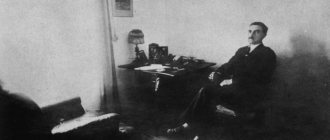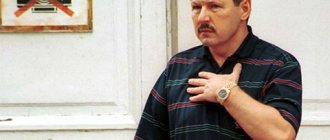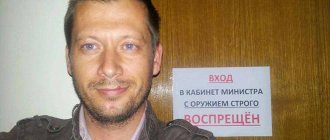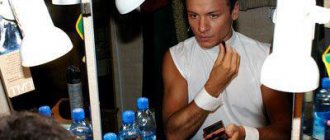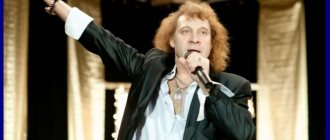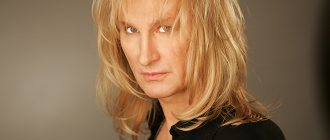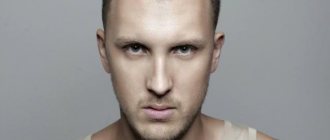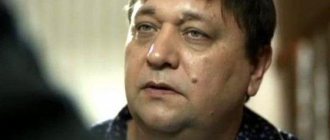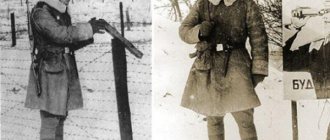Popov Alexander Vladimirovich
Born 11/16/1971
Achievements:
- Four-time Olympic champion (Barcelona 1992 - 50 and 100 meters freestyle, Atlanta 1996 - 50 and 100 meters freestyle).
- Five-time silver medalist of the Olympic Games (Barcelona 1992 - 4x100 meter freestyle and medley relay, Atlanta 1996 - 4x100 meter freestyle and medley relay, Sydney 2000 - 100 meter freestyle).
- Six-time world champion (Rome 1994 - 50 and 100 meters freestyle, Perth 1998 - 100 meters freestyle, Barcelona 2003 - 50 and 100 meters freestyle, 4x100 meters freestyle relay).
- Four-time silver medalist at the World Championships (Rome 1994 - 4x100 meter freestyle and medley relay, Perth 1998 - 50 meter freestyle, Barcelona 2003 - 4x100 meter medley relay).
- Bronze medalist at the 1998 World Championships in the 4x100 meter freestyle relay.
- 21-time European champion.
Through fear to success
Born in a small town in the Sverdlovsk region, the future four-time Olympic champion as a child, oddly enough, did not know how to swim and was afraid to swim. It was the fear of water that prompted Sasha’s parents to send him to the pool. At first, the boy simply swam to improve his health, but soon he became interested in swimming as a sport, and Popov began competing in competitions, winning his first medals.
At the age of fourteen, Popov becomes the champion of Russia among juniors and goes to Volgograd - there are more opportunities for developing his career. For a long time, Alexander floats on his back, but cannot achieve much success. Everything changed when Gennady Turetsky began working with Popov. He suggested that the young swimmer retrain from backstroke to freestyle, arguing that Popov’s anthropometric data were suitable for freestyle.
Olympic legend
As Turetsky looked into the water, the transition to freestyle opened the path to success for the young swimmer. Popov first showed his ambitions in Athens in 1991, becoming the European champion in the 100-meter dash and in two 4x100-meter relay races - freestyle and medley. Meanwhile, the mighty Soviet Union collapsed, the country was in a frankly dismantled state, and the Olympics in Barcelona were approaching.
Our athletes went to Spain under the flag of the United Team and performed brilliantly. Despite the unclear status of the team, the results in most disciplines were outstanding. One of the main creators of success was 20-year-old Alexander Popov. Having won two gold individual awards in the 50 and 100 meter freestyle, the newly minted Olympian led our team to two silver medals in the 4x100 meter freestyle and medley relay races.
Alexander Popov at the 1992 Olympics
Popov instantly becomes a hero of Russia and a world celebrity. From now on, Alexander is the favorite of all the swims in which he starts. In 1993, he became a four-time European champion - twice in individual swims and twice in relays. Popov also conducts his first World Championships in Rome brilliantly, leaving no one a chance at his distances. Plus, his efforts lead to two silver medals in relays.
Having repeated the success of two years ago in Vienna at the 1995 European Championships and becoming a four-time European champion, Popov is preparing for the Olympics in Atlanta. However, this time Alexander was not the undisputed favorite - our champion was challenged by the American Gary Hall, who approached the final heats in excellent shape. The American's readiness is evidenced by the fact that US President Clinton came to the final of the 50-meter freestyle. The stands were ready to burst into applause, but they had to applaud something else - Popov swam faster and became the champion.
A similar result was recorded in the 100-meter race. With this victory, Popov wrote his name in history - he became the first swimmer to become a champion in both sprint freestyle distances at two Olympics in a row. To this day, no one has been able to repeat this achievement!
Alexander Popov - Olympic champion 1996
But that was not all - Popov won two silver medals, already on duty, as part of the freestyle and combined relay races. Despite all his efforts and the speed of our other champion Denis Pankratov, he still failed to swim to gold - the American four had no weak points, unlike our relay.
Assassination and return to sports
Popov returned home a well-deserved triumph, but not for everyone. Unfortunately, there are people in the world for whom nothing is sacred. While walking around evening Moscow in the company of friends, Popov heard an insult addressed to his girlfriend, who later became his wife. Of course, Alexander could not pass by. But hooliganism and meanness are not associated with honor and conscience - Popov was stabbed in the torso with a knife and hit on the back of the head with a stone.
Having received severe damage to his lungs and kidney, Alexander was taken to the hospital, where he underwent surgery. The doctor who operated on the champion did everything to avoid damaging the muscles, leaving Popov a chance to continue his career.
After leaving the hospital, Alexander was baptized, got married and returned to the pool. Together with his coach Gennady Turetsky, he actually restarted his career. Seville 1997 was supposed to show whether the real Popov returned to sailing. The result is four gold awards. It is clear to everyone: Popov is back in action and will prepare for the Olympics in Sydney.
Popov began testing Australian waters in 1998, at the World Championships in Perth. In fact, he performed at home - Alexander moved to Australia for permanent residence after the Olympics in Barcelona, following his coach. The severity of his performance was also added by the fact that Popov’s main rival was supposed to be the Australian swimmer Michael Klim, whose coach was also Gennady Turetsky.
Alexander Popov
As two years earlier, in Atlanta, against all odds, Popov was the first to touch the side, once again confirming his dominance at the most prestigious distance. In Perth, Alexander received a special cup from the International Swimming Federation, which recognized our compatriot as the swimmer of the decade. However, not everything was smooth at that championship - for the first time in an individual swim, Popov did not become a champion. This happened at fifty dollars.
Nevertheless, Popov is recognized as the favorite of the Olympics in Sydney. Even silver and bronze awards in Istanbul 1999 cannot shake this status, especially since a year later, in Helsinki, Popov again takes the entire set of European gold medals. Meanwhile, the Dutchman Pieter van den Hoogenband is gaining momentum, taking fourth places in both sprint disciplines in Atlanta.
How many times has Popov won not thanks to, but in spite of, that sometimes it seemed as soon as Alexander touched the bedside table at the start, his opponents were already overwhelmed. The 100-meter swim could have made Alexander the first swimmer in history to become a three-time Olympic champion in the most prestigious swimming distance. Popov swam well and confidently, but that evening it was not he who was destined to become the hero, but Hoogenband, who, moreover, won at a distance twice as long, sensationally defeating the Australian Thorpe. There was still a chance to redeem himself at 50 meters, but in this swim Alexander was not like himself, touching the side in sixth. This was the first swim in which Popov did not win a medal.
Biography of a swimmer
The biography of Alexander Popov, a famous swimming champion, began in a closed town near Sverdlovsk, where he was born on a gloomy autumn evening in 1971. The parents were concerned about the child’s poor health, devoted a lot of time to his physical education and had absolutely no idea that they were paving the way for him to a difficult sports victory. As soon as he entered first grade, they decided to continue the boy’s athletic development through swimming.
When Sasha's parents took him to the pool for the first time, he was afraid of the water , and it took a long time for him to love it so much that he had to be forcibly sent home after training. When the boy was only ten years old, he won the first competition in his life: he won at a distance of 25 meters.
His diligence was appreciated by coach Galina Vitman, who saw great potential in him. Little did she know how fathers and mothers almost forcibly forced little children to climb into the pool they hated just because the parents wanted it.
And Sasha became so interested in swimming that he abandoned school, and unwanted marks appeared in his diary. His parents were concerned about his attitude to school and asked him to quit classes if they interfered with his studies. But the son firmly said that he would not give up swimming. The coach had to talk to him strictly about perseverance, about the strength of character of a real athlete. There was no doubt that swimming took possession of all the child’s thoughts and feelings. However, at the age of 12, he still had to choose: either serious swimming or study, and he chose the first.
After school, there was no question about where to study; Popov had long known that he would enter the Volgograd Institute of Physical Culture. Within the walls of the educational institution, his mentor was Anatoly Zhuchkov, who decided to continue working with him on backstroke swimming. The classes did not bring success, despite his efforts, and Alexander went to Gennady Turetsky , who immediately saw a good sprinter in his ward.
Freestyle training began, and it was a real learning experience. Turkish demanded harshly, but explained intelligently and fairly.
In 1991, when food supply was difficult in Russia, “Gen Genych” took his students to Italy to feed them a little. He believed that athletes should eat healthy and well.
Popov's sports career
The first brilliant victory was participation in 1991 at the European Championships in Athens, where Alexander received 4 gold medals, covering distances of 50 and 100 meters. The next year brought Alexander Popov real sports fame: at the Olympic Games in Barcelona he won two gold medals. Then there was the European Championship and two more gold medals. In 1993, the athlete moved to Australia, where his coach had been working for a long time.
The fact is that after the competition in Barcelona, the team coached by Turetsky broke up. The leaders left, he himself signed a contract with a foreign team and a year later invited Popov, who proved his professionalism in 1994:
- won the World Championship twice;
- a year later in Vienna he managed to earn top awards in the individual and team competitions;
- Alexandra Popova became famous throughout the world at the 1996 Olympics, held in the American town of Atlanta.
Victory here was not easy. Sports experts assumed that the gold would go to the American Hall. The athlete was in excellent shape and showed the best results in training competitions.
Besides, he was performing in his own country, and that also meant a lot. Even President Clinton came to support him. However, the Americans were disappointed: Russian swimmer Alexander Popov won both gold medals, and Bill Clinton worthily listened to the Russian anthem to the end.
presented the medal for the 100-meter dash . Thus, he returned to his homeland as a two-time Olympic champion and from that moment his career growth went up; at that time he did not even know how many achievements lay ahead of him. But this year, in addition to triumph, brought the champion and his fans the most difficult test: he was attacked by a hooligan. Already in Russia, he and a friend accompanied girls they knew to the metro and heard an insult addressed to one of them from the seller of a commercial stall.
A fight ensued, and Alexander was stabbed in the left side. The wound turned out to be serious: the knife damaged the kidneys and lung. It is unknown how the incident could have ended if not for the professionalism of surgeon Manvelidze, who performed a unique operation by making an incision along the muscle, thereby maintaining its mobility. This made it possible for the athlete not only to return to action a year later, but also to win many more victories. Later, a documentary film called “Champions” will be made about this. Faster. Higher. Stronger".
New victories
It took the legendary swimmer exactly a year to recover his health after surgery. The family and his girlfriend Dasha were nearby all the time, and he quickly returned to normal. He couldn’t do it any other way, because in the world of swimming he was called nothing less than the Tsar.
And the athlete was ready for new achievements:
- In the summer of 1997 in Seville, he won two gold medals.
- Next year - another victory at the Olympics.
- Russian swimmer Alexander Vladimirovich Popov is awarded the Cup of the Outstanding Athlete of the Decade from the International Swimming Federation.
At the third Olympics in Sydney, he failed to get gold, but he still won second place in the 100-meter race.
Many sports analysts wrote then that the swimmer’s sports career was in decline, but exactly three years later in Barcelona he again took the lead at a short distance.
According to the athlete, in 2000, so-called “miracle suits” appeared, which supposedly help the swimmer develop the required speed in the water. He always performed in only swimming trunks, he believed that it was a person who was swimming, not a suit. In 2005, Alexander Popov left sports, works for the Olympic Committee and is involved in social activities.
As a member of the Council on Physical Education and Sports under the President, he tries in every possible way to defend the rights of athletes . He never runs away from foreign journalists, speaks good English, and willingly shares his experience in the sports media. An autobiographical book was published in France, a summary of which the champion outlined in one of his interviews.
Under his leadership, a whole group is working on projects for sports facilities.
If we talk briefly about the activities of the academy, its employees intend to give citizens of the country as many opportunities as possible to play sports and create appropriate conditions for this. Now the four-time Olympic champion lives with his family in Moscow. As for pages on social networks, there are two opinions on this matter: either he does not communicate on the Internet at all, or he uses pseudonyms and nicknames. The athlete cannot be found on Instagram and VKontakte, although many users are registered with the name “alexander popov”, including bloggers, singers, designers, but there is no athlete.
Barcelona swan song
Experts decided that this was the end. But Popov had a different opinion. He missed the 2001 World Championships, and a year later at the European Championships he was content with only gold in the medley relay.
It would seem that nothing foreshadowed the return of big victories, but Popov returned again. Just like in 1992, Barcelona became happy for him. Alexander beats the favorite, Hoogenband, in a brilliant manner in the 100-meter dash, becoming its three-time winner at the world championships. At 50 meters, Popov makes a golden double, proving that the first success was natural.
Alexander Popov - 2003 world champion
Another important event happened in Barcelona - for the first time at the World Championships, Popov became the winner in the 4x100 meter freestyle relay. This time, the team partners did not let their leader down, who confidently swam his last stage. He was also good in the medley relay, but, as usual, our team was unable to put up an equal group of four, resulting in second place.
This is how Popov actually entered the same water for the third time and began to prepare for his fourth Olympics. Alexander arrived in Athens as a shadow favorite - after all, the Dutch opponent is younger. It is not known what happened, but the pale champion shadow of Popov floated in Greece. As it turned out later, there was a mistake in preparation for the Olympic Games. Alas, the championship point was set a year earlier, in Barcelona - the city that became the starting point in a series of grandiose victories for our swimmer at the Olympics and world championships.
Alexander Popov now
In 2020, Alexander Popov went to the Olympics in Rio de Janeiro, but not as an athlete, but as an ambassador of the Omega brand, the official timekeeper of the Olympic Games.
Alexander Popov
In 2020, the athlete became a member of the Supreme Supervisory Council of the All-Russian Swimming Federation. In addition, Alexander Popov is the chairman of the Public Council under the Ministry of Sports of the Russian Federation and the chairman of the public organization “Russian Physical Culture and Sports Society “Lokomotiv”.
Grand Champion
Alexander Popov is the brightest phenomenon in world sports of the late twentieth century, a man who glorified Russia in such a difficult historical period for it. Popov is the best freestyle sprinter in the history of world swimming and the undisputed No. 1 swimmer in Russia.
And this is also a man whose character has repeatedly forced his opponents to bite their elbows after the finish, because they, like many experts, did not take into account one thing - you cannot underestimate the heart of the Champion, which was and remains for everyone the legendary swimmer Alexander Vladimirovich Popov.
Video archive dedicated to Alexander Popov
Popov in the Mine class
However, the working conditions at the university did not satisfy Popov, and in 1883 he accepted an offer to take the position of assistant in the Mine Officer Class in Kronstadt, the only educational institution in Russia in which electrical engineering occupied a prominent place and work was carried out on the practical use of electricity (in maritime affairs). Popov worked in the Mine Officer Class for 18 years, combining teaching activities with scientific research. Here Alexander Stepanovich Popov began the study of electromagnetic waves, which culminated in the invention of radio. Popov did not miss a single discovery or invention in the field of energy. After the publication in 1888 of the works of G. Hertz, who discovered the “rays of electric force,” Popov began to study electrical phenomena. From 1890 to 1900 Popov also taught at the Marine Engineering School in Kronstadt.
